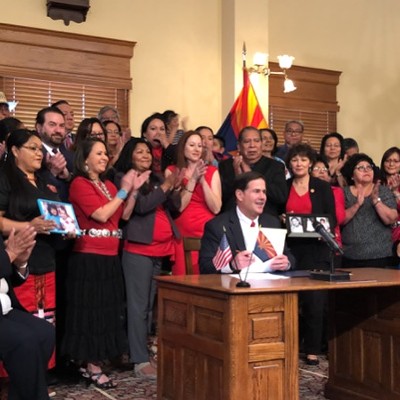She came under attack from her fellow Democratic House members. She faced criticism from Gov. Janet Napolitano. And she was the target of anonymous robo-calls that accused her of breaking her promise to protect Arizona's children "by voting with Phoenix Republicans on a budget that puts corporate welfare above health care for Tucson's children, making our schools choose between full-day kindergarten and teacher pay."
The criticism came after Lopez, along with Democrats Olivia Cajero-Bedford of Tucson and Pete Rios of Hayden, joined Republicans on the House Appropriations Committee to support a $10.6 billion House budget package that includes $68 million in tax cuts and less social spending than a $10.6 billion Senate budget proposal that also emerged last week.
Lopez says she supported the House budget plan as a first step toward getting the budget process underway.
"What we did in appropriations is not the final budget," says Lopez, who adds that she wouldn't support the same budget if it came to the House floor for a final vote. "There's still a lot of work to be done."
Lopez says that she's "pretty distressed that Democrats have attacked me. It's one thing for them to be angry, but to do the robo-calls is over the top."
But Rep. Phil Lopes of Tucson, the minority leader in the House, says support from the three Democrats on the Appropriations Committee allowed House Speaker Jim Weiers enough political cover to call his budget plan "bipartisan," even though he didn't negotiate with most of the House Democrats.
"About 15 minutes after the Appropriations Committee adjourned, the Republicans sent out a press release saying it was a bipartisan budget," Lopes says. "I'm upset. I'm very, very disappointed. And I'm not the only one--a whole lot of people out there are upset."
Lopes says he prefers the Senate budget, which includes only $7 million in tax cuts and more social spending. That budget was carved out by Senate President Tim Bee, who met with both Republicans and Democrats when putting together the spending plan in hopes of passing a plan that would avoid Napolitano's veto stamp.
Earlier this week, after a slight delay related to a dispute over tuition tax credits, the Senate budget passed the Senate Appropriations Committee. Leaders in both chambers were negotiating with each other in hopes of reaching a compromise before taking either budget to a full vote in their respective chambers.
Lopez insists that her vote to support the House budget was a step toward reconciling the two plans.
"The political reality is, a Senate budget is not going to come over and just get adopted by the House without any kinds of amendments," Lopez says. "If you can get more money into the House budget--and the speaker and the Republican leadership were willing to support us getting some amendments in there--then that gets them closer."
But Lopes argues that the three Democrats who supported the House budget undercut the party's negotiation ability.
"We were flexing our muscle," Lopes says. "And if they hadn't done that, we would have been able to flex our muscle much better. If they hadn't done that, that Senate budget would probably already be over here, and we would be voting on it."
The two budgets are relatively close to one another. Some key differences:
· The Senate budget targets $46 million for additional teacher pay, while the House budget puts $29 million in for additional teacher pay.
· The House budget includes an additional $10 million for charter schools; the Senate budget includes no new funding.
· The House budget includes a $28.5 million cut in corporate income taxes, $10 million in tax credits for college savings plans, $5.5 million in tax credits for insurance premiums, $3.6 million in tax credits for charitable donations and $5 million in expanding a research-and-development tax credit. The Senate budget has none of those cuts.
· The House budget provides $8 million for the Phoenix medical school; the Senate budget includes $25 million.
· The Senate budget allows the state to extend the life of highway-construction bonds from 20 years to 30 years, freeing up an estimated $400 million for freeway construction. The House budget doesn't address the issue, although House spokesman Barrett Marson says House leaders remain open to the extension.
· The Senate budget increases the amount the state pays for day-care rates for low-income families; the House budget does not.
· The Senate allows schools to inform parents about the opportunity for state-subsidized health-care insurance for kids; the House budget does not address the issue.
The budget remains the major piece of unfinished business for the legislative session, which has now surpassed 120 days--a key date, because lawmakers will see their per diem payments reduced.

















